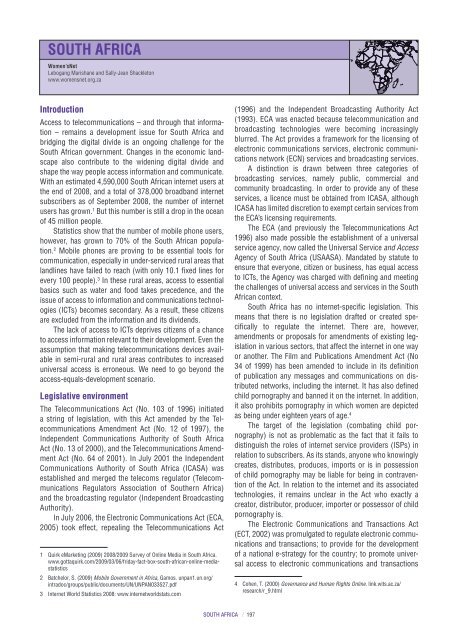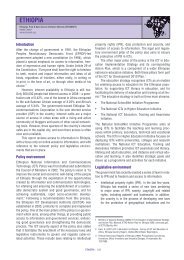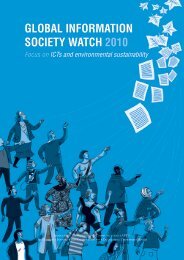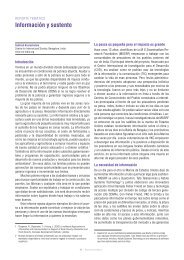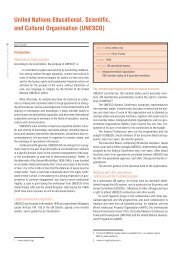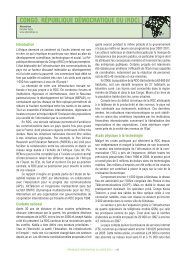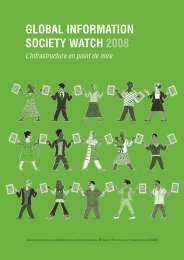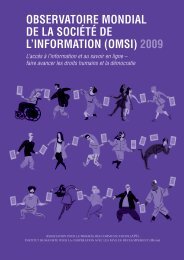Download the full report - Global Information Society Watch
Download the full report - Global Information Society Watch
Download the full report - Global Information Society Watch
Create successful ePaper yourself
Turn your PDF publications into a flip-book with our unique Google optimized e-Paper software.
South Africa<br />
Women’sNet<br />
Lebogang Marishane and Sally-Jean Shackleton<br />
www.womensnet.org.za<br />
Introduction<br />
Access to telecommunications – and through that information<br />
– remains a development issue for South Africa and<br />
bridging <strong>the</strong> digital divide is an ongoing challenge for <strong>the</strong><br />
South African government. Changes in <strong>the</strong> economic landscape<br />
also contribute to <strong>the</strong> widening digital divide and<br />
shape <strong>the</strong> way people access information and communicate.<br />
With an estimated 4,590,000 South African internet users at<br />
<strong>the</strong> end of 2008, and a total of 378,000 broadband internet<br />
subscribers as of September 2008, <strong>the</strong> number of internet<br />
users has grown. 1 But this number is still a drop in <strong>the</strong> ocean<br />
of 45 million people.<br />
Statistics show that <strong>the</strong> number of mobile phone users,<br />
however, has grown to 70% of <strong>the</strong> South African population.<br />
2 Mobile phones are proving to be essential tools for<br />
communication, especially in under-serviced rural areas that<br />
landlines have failed to reach (with only 10.1 fixed lines for<br />
every 100 people). 3 In <strong>the</strong>se rural areas, access to essential<br />
basics such as water and food takes precedence, and <strong>the</strong><br />
issue of access to information and communications technologies<br />
(ICTs) becomes secondary. As a result, <strong>the</strong>se citizens<br />
are excluded from <strong>the</strong> information and its dividends.<br />
The lack of access to ICTs deprives citizens of a chance<br />
to access information relevant to <strong>the</strong>ir development. Even <strong>the</strong><br />
assumption that making telecommunications devices available<br />
in semi-rural and rural areas contributes to increased<br />
universal access is erroneous. We need to go beyond <strong>the</strong><br />
access-equals-development scenario.<br />
Legislative environment<br />
The Telecommunications Act (No. 103 of 1996) initiated<br />
a string of legislation, with this Act amended by <strong>the</strong> Telecommunications<br />
Amendment Act (No. 12 of 1997), <strong>the</strong><br />
Independent Communications Authority of South Africa<br />
Act (No. 13 of 2000), and <strong>the</strong> Telecommunications Amendment<br />
Act (No. 64 of 2001). In July 2001 <strong>the</strong> Independent<br />
Communications Authority of South Africa (ICASA) was<br />
established and merged <strong>the</strong> telecoms regulator (Telecommunications<br />
Regulators Association of Sou<strong>the</strong>rn Africa)<br />
and <strong>the</strong> broadcasting regulator (Independent Broadcasting<br />
Authority).<br />
In July 2006, <strong>the</strong> Electronic Communications Act (ECA,<br />
2005) took effect, repealing <strong>the</strong> Telecommunications Act<br />
1 Quirk eMarketing (2009) 2008/2009 Survey of Online Media in South Africa.<br />
www.gottaquirk.com/2009/03/06/friday-fact-box-south-african-online-mediastatistics<br />
2 Batchelor, S. (2009) Mobile Government in Africa, Gamos. unpan1.un.org/<br />
intradoc/groups/public/documents/UN/UNPAN033527.pdf<br />
3 Internet World Statistics 2008: www.internetworldstats.com<br />
(1996) and <strong>the</strong> Independent Broadcasting Authority Act<br />
(1993). ECA was enacted because telecommunication and<br />
broadcasting technologies were becoming increasingly<br />
blurred. The Act provides a framework for <strong>the</strong> licensing of<br />
electronic communications services, electronic communications<br />
network (ECN) services and broadcasting services.<br />
A distinction is drawn between three categories of<br />
broadcasting services, namely public, commercial and<br />
community broadcasting. In order to provide any of <strong>the</strong>se<br />
services, a licence must be obtained from ICASA, although<br />
ICASA has limited discretion to exempt certain services from<br />
<strong>the</strong> ECA’s licensing requirements.<br />
The ECA (and previously <strong>the</strong> Telecommunications Act<br />
1996) also made possible <strong>the</strong> establishment of a universal<br />
service agency, now called <strong>the</strong> Universal Service and Access<br />
Agency of South Africa (USAASA). Mandated by statute to<br />
ensure that everyone, citizen or business, has equal access<br />
to ICTs, <strong>the</strong> Agency was charged with defining and meeting<br />
<strong>the</strong> challenges of universal access and services in <strong>the</strong> South<br />
African context.<br />
South Africa has no internet-specific legislation. This<br />
means that <strong>the</strong>re is no legislation drafted or created specifically<br />
to regulate <strong>the</strong> internet. There are, however,<br />
amendments or proposals for amendments of existing legislation<br />
in various sectors, that affect <strong>the</strong> internet in one way<br />
or ano<strong>the</strong>r. The Film and Publications Amendment Act (No<br />
34 of 1999) has been amended to include in its definition<br />
of publication any messages and communications on distributed<br />
networks, including <strong>the</strong> internet. It has also defined<br />
child pornography and banned it on <strong>the</strong> internet. In addition,<br />
it also prohibits pornography in which women are depicted<br />
as being under eighteen years of age. 4<br />
The target of <strong>the</strong> legislation (combating child pornography)<br />
is not as problematic as <strong>the</strong> fact that it fails to<br />
distinguish <strong>the</strong> roles of internet service providers (ISPs) in<br />
relation to subscribers. As its stands, anyone who knowingly<br />
creates, distributes, produces, imports or is in possession<br />
of child pornography may be liable for being in contravention<br />
of <strong>the</strong> Act. In relation to <strong>the</strong> internet and its associated<br />
technologies, it remains unclear in <strong>the</strong> Act who exactly a<br />
creator, distributor, producer, importer or possessor of child<br />
pornography is.<br />
The Electronic Communications and Transactions Act<br />
(ECT, 2002) was promulgated to regulate electronic communications<br />
and transactions; to provide for <strong>the</strong> development<br />
of a national e‐strategy for <strong>the</strong> country; to promote universal<br />
access to electronic communications and transactions<br />
4 Cohen, T. (2000) Governance and Human Rights Online. link.wits.ac.za/<br />
research/r_9.html<br />
south africa / 197


